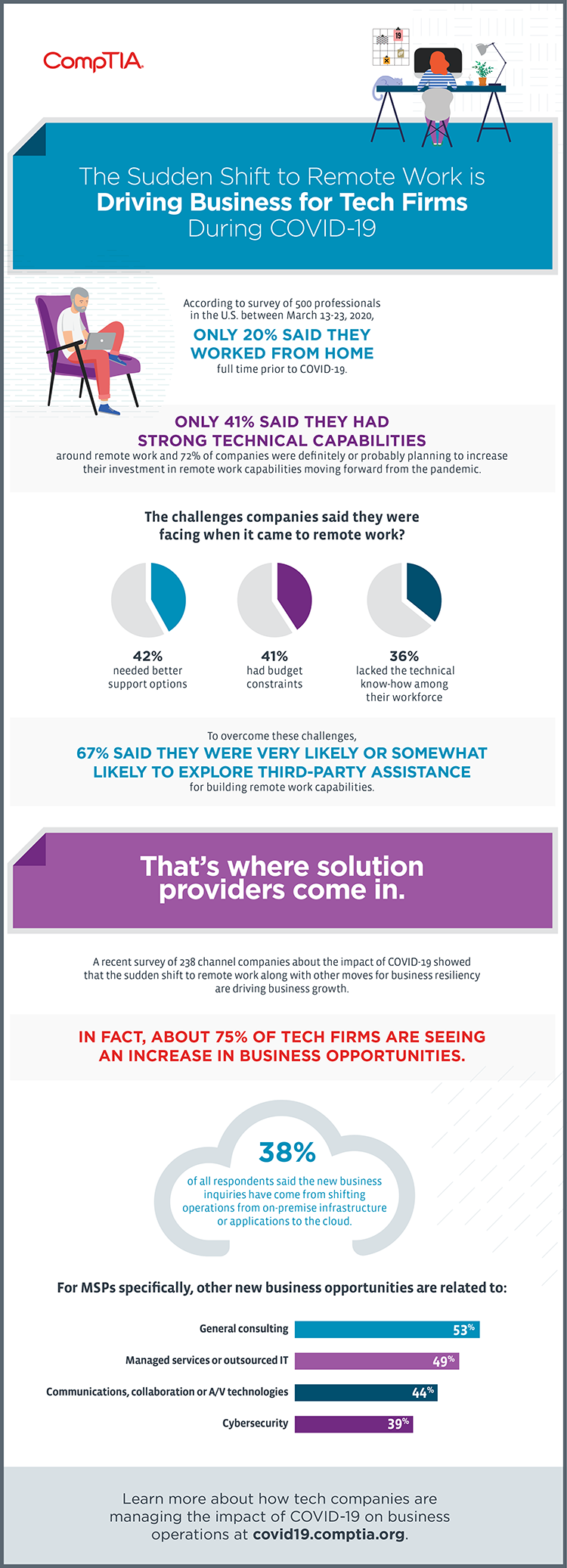
There is challenge, but also opportunity for channel partners selling tech solutions in the current COVID-19 pandemic environment, according to two recent surveys fielded by CompTIA.
In the first survey, about 20% of 500 professionals surveyed by CompTIA between March 13-23, said they worked from home full time prior to COVID-19, but 72% of respondents said they planned to increase their investment in remote work capabilities because of the pandemic.
A second survey, fielded later in March to 238 members of CompTIA’s IT Security, Emerging Tech and Managed Services communities as well as members of the Industry Advisory Councils, found that 75% of respondents had seen an increase in business opportunities since COVID-19.
Into the Pandemic: Companies and Remote Capabilities
According to the first CompTIA survey, only 41% of professionals said their company had strong technical capabilities when it came to remote work, hinting that many companies still faced challenges with their switch to remote work. In fact, 42% said they needed better support options; 41% had budget constraints; and 36% lacked the technical know-how among their workforce. Companies also said the top four investments that would provide significant benefit to remote work capabilities were virtual private network (VPN), cloud, collaboration applications and cybersecurity.
To overcome these challenges and implement these investments, 67% said they were very likely or somewhat likely to explore third-party assistance for building remote work capabilities.
Meeting Immediate Needs, According to Member Tech Firms
The necessity of increased investments and the need for third-party assistance when building and securing remote work capabilities was quickly realized once stay-at-home orders were implemented in late March. Martin Bannister, managing director of Kogo Limited and UK Business Technology Community member, saw clients struggling to take their employees remote particularly from companies that lacked the infrastructure to do so.
“We had everybody needing to work remote. A lot of businesses had no plan at all, and we had to get all machines to remote in from home. There were challenges with home printers and home internet. A lot of companies didn’t have enough connections for all staff to work at the same time. They were used to a few remote people, but not the entire company,” said Bannister.
The lack of a plan—or at least the lack of plan that met the needs of a pandemic, which sent employees home en masse—created an onslaught of work for tech firms. With three-quarters of member tech firms reporting an increase in business amid COVID-19, the majority of new inquiries came from shifting operations from on-premise infrastructure or applications to the cloud—38% of all respondents.
“Managed service providers are gaining clients because so many customers didn’t want the cloud before, and now, they needed to make the move yesterday,” said Mike Celayeta, director of MSP programs at CloudJumper and executive council member of the Managed Services Community.
What Clients Need Moving Forward
Moving clients to the cloud isn’t the only business tech firms are seeing. According to our member survey, channel companies also initially saw business opportunities from general consulting (53%); managed services or outsourced IT (49%); communications, collaboration or A/V Technologies (44%); and cybersecurity (39%).
Now a month into working remote, MSPs are continuing to see clients who need support with their remote capabilities, including those that are settling into the new normal of having a distributed workforce and wondering whether being remote makes sense long term.
“Because most MSP clients are professional services firms, I don’t think you’re going to see a big downturn for the MSP world. Maybe a little bit of a slowdown, but those businesses are still going to be around, and they’re going to have a higher need because a lot of businesses that no longer have a physical building will be converting to a remote workforce,” said Celayeta.
Amy Babinchak, president of Harbor Computer Services and a member of the executive council on CompTIA's Managed Services Community, agreed that business as usual wasn’t going to look like it did before and tech firms would need to be prepared to provide new services accordingly.
“I don’t believe our clients are going back to business as usual, which means we can’t either. We have to meet them where they are and provide services that are applicable to those situations, which we don’t yet. There’s a lot of uncertainty, but we will be changing services, so we're still providing what’s needed,” said Babinchak. “Right now, we’re emphasizing training employees who are not technically skilled. When transitioning to cloud, now that those people are working from home, those deficiencies are obvious.”
MSPs are also taking time now to revisit their initial set-ups, discussing cybersecurity needs with clients and talking about what kinds of additional consulting clients might need in order to better manage employees in their newly remote environments.
According to Jhovanny Rodriquez, vice president and co-founder at Greenlink Networks and a member of the executive council on CompTIA's Managed Services Community, “Now that everyone is set up, businesses are coming back and saying, ‘we’re not getting the productivity out of remote workers because of the emergency set up, let’s clean this up.’ We’re growing because people are realizing that if they had the right MSP they would have been in a different position.”
Download the infographic.
For more information and resources to help customers through the coronavirus pandemic, visit CompTIA’s COVID-19 Forum.

 Add CompTIA to your favorite RSS reader
Add CompTIA to your favorite RSS reader

